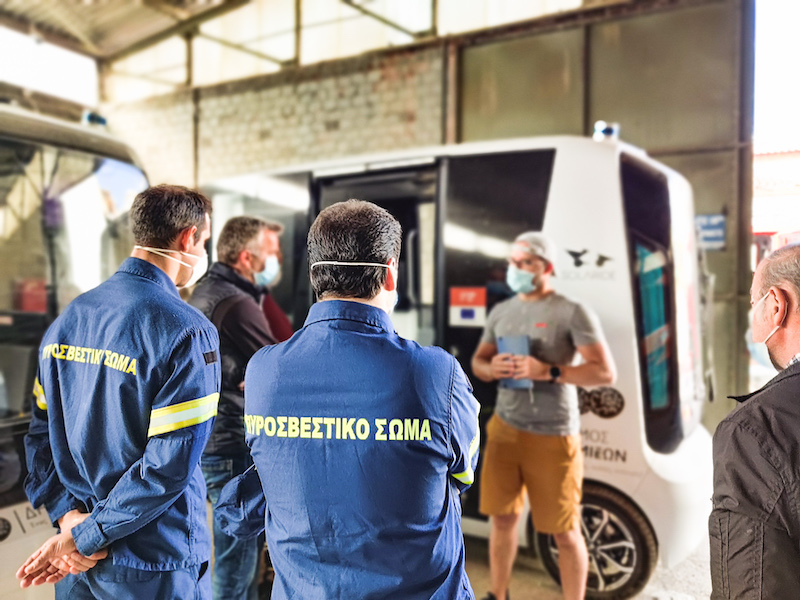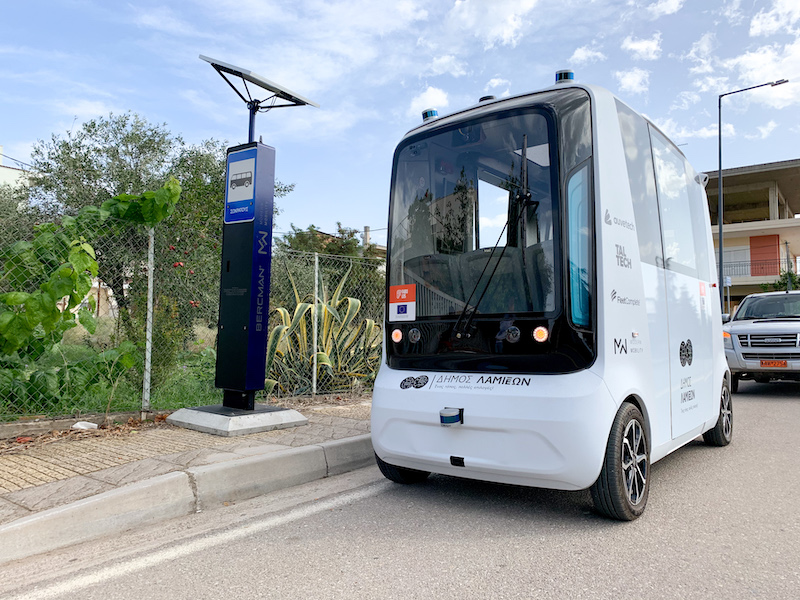Fabulos completes autonomous public transport pilot project in Greece
An autonomous public transport pilot project in Greece, led by an Estonian consortium called the Future Automated Bus Urban Level Operation Systems (Fabulos), has now successfully ended. After two months and 1,930 km driven in the streets of the municipality of Lamia, nearly 400 people used autonomous bus “Iseauto”.
The bus has been developed in Estonia and offers a full-scale autonomous public transportation service in Lamia.
The autonomous minibus developed by AuveTech in Estonia is the first Level 4 category autonomous vehicle that has officially been declared “street-legal” in Greece.
The bus was tested under various circumstances in Lamia. It had to cope with the traditional traffic, take into consideration drivers and pedestrians, keep constant contact with the operating room and smart bus-stops.
The top priority for Iseauto was the safety of pedestrians and light travellers. During the test period an expert fully aware of the characteristics of the bus accompanied each ride. The maximum speed was limited by the road authorities to 25 km/h.

A survey conducted during the pilot showed that passengers highly appreciated the experience. Passengers were particularly pleased with the safety of the self-driving bus service and expressed their readiness to use autonomous transport for their daily commute.
Mari-Ly Klaats, board member of AuveTech, says: “Deployment in Lamia marks a great milestone for us, being the last step of the Fabulos project which has been a significant part of AuveTech during the past few years. Together with our consortium, we have proven that the future of mobility holds great opportunities.
“Nevertheless, this has demonstrated to be only the beginning of our journey and it is great to see it has embarked in Greece with such great success and positive feedback. Our shuttles have found a new home in the world and we are eager to come back even smarter and better in the future.”
The Vice Mayor of Development Planning and E-government of Lamia, Dimitris Kyritsis says that the Lamia pilot has been an excellent opportunity for the city, the citizens, the visitors, the local businesses, and the officials to evaluate the suitability, feasibility and sustainability of the technology.

Also, the pilot has highlighted the tangible benefits of autonomous bus services in public streets.
“We truly believe that in the near future robot buses will be considered a natural extension of public transport in the city”, says Kyritsis.
Tanel Talve, representative of the lead partner of the Estonian consortium, Modern Mobility, states that the aim of this kind of pilot projects all over the world is to prepare cities to deliver future technologies to improve public services.
The pilots like this one in Lamia are a preparation for autonomous vehicles to take a role in our daily public transport system in the future.
Small, green and silent last-mile public transport solutions suit to extend bus-lines in small streets, residential areas and also in city centres where regular buses are not feasible in terms of costs or size. The pilots are aimed to obtain real-life experience to integrate the autonomous buses into the public transport system.
The Smart Mobility Management System tested in Lamia is a platform where all partners in the system are communicating with each other and in the future also with traditional public transport.

Smart bus-stops will allow passengers to request a ride or notify the bus about their special needs (wheel-chair, pram and so on) using either a screen in the bus-stop or a mobile application.
The buses can then avoid empty rides out of rush-hours and still be available for passengers when needed. Implementing new technologies helps to change public transport more user-friendly and smoother, encourages to abandon one’s personal car and makes public space greener.
The scientific work of the pilot, developing innovative solutions and testing them is the responsibility of Tallinn University of Technology (TalTech), that also partnered in working out the first Iseauto prototype some years ago.
The TalTech autonomous vehicles research team led by Raivo Sell has acquired global recognition in the field due to their unique results, fast development process and successful cooperation with enterprises.
The Fabulos project is financed by the European Union and coordinated by Forum Virium Helsinki. The pilots in both Tallinn (Estonia) and Lamia (Greece) are carried out by the Mobile Civitatem consortium, consisting of Modern Mobility, TalTech, Auve Tech and Fleet Complete, with Bercman Technologies acting as cooperation partner.

